You’re a hotelier, sitting in your plush office with walls adorned by pictures of stunning properties. You’ve just signed off on another successful quarter, and the future looks bright. But then it hits you – who exactly are these people booking rooms at your hotels? Who’s making up that bustling lobby every weekend?
This is where understanding your hotel target market comes into play.
A deep dive into the heart of hospitality marketing can seem daunting initially. There’s no denying its complexity with myriad customer types ranging from solo travelers to retiree families; all seeking different experiences and value propositions.
We’ve got you covered! This post is dedicated to dissecting this complex topic like never before. We’ll guide you through everything – from pinpointing crucial market segments, harnessing guest insights via surveys or online reviews, and crafting personalized experiences, right up to using top-notch CRM software.
Benefits of Defining a Target Audience for Hotels
Determining your hotel’s target audience is like setting the GPS before embarking on a journey. It gives you clear direction and helps ensure that every turn you make – from marketing efforts to service enhancements – brings you closer to your desired destination: guest satisfaction.
Catering to specific hotel target market segments can lead to loyal customers who feel their needs and preferences have been understood and catered for. Imagine if guests could find everything they were looking for in one place. That’s what positioning through a defined target audience does; it makes sure each amenity, offer, or interaction speaks directly to the hearts (and wallets) of those most likely to appreciate them.
Identifying your key market segment isn’t just about improving guest experience though. It also sharpens competitiveness by allowing hotels to use resources more efficiently. Instead of trying to be all things to all people, hotels can focus their attention on delivering exceptional experiences tailored specifically to their chosen demographic.
1. A Defined Target Audience Boosts Marketing Efforts
Finding ways into the minds (and diaries) of potential guests is no easy feat but understanding exactly who they are makes this task much simpler. When you know where your ideal clients spend time online or offline, what they read, watch, or listen to, crafting compelling messages becomes less guesswork and more science.
Your website content strategy will resonate with readers because it feels personalized. Social media posts hit home because they speak directly about travel habits that are relevant or familiar while email campaigns capture interest as offers align closely with personal preferences such as solo travel getaways or romantic escapades – whatever floats your boat.
2. Sales Efforts Become Easier to Measure
This goes without saying! When you have a set of guests segmented based on different characteristics, you know which is the right market. And accordingly, you can target them with content they are more likely to engage with. When it comes to sales, it helps you pitch better.
3. You can Invest Better
When you decide to invest in your property, how do you usually do it? If you do it with just a thought in your head that guests would like certain things, then it might not work.
You have to play it strategically. Look at your guests’ segments and try to determine what type of guests you serve the most and what they usually seek. This narrows down your list of things to invest in and enables you to make informative decisions.
4. You can Meet Your Guests’ Expectations Better
Personalization plays a major role in the hospitality industry. When you segment your guests, you get a clear picture of what their preferences are.

Understanding Hotel Target Market Segmentation
The hospitality industry, especially hotels, is no stranger to the importance of understanding its hotel target market. The process of hotel target market segmentation allows for a more focused approach in identifying and catering to specific groups such as backpackers, retirees, or families.
One way that hotels can identify these different segments is by observing travel habits. For instance, solo travelers often have unique preferences compared to vacationing families. Solo travelers may prioritize social interactions and experiences while families might look for convenience and safety features.
A popular segment in recent years includes FITs (free independent travelers), who are typically looking for customized experiences rather than traditional tour packages.
Main Types of Customer Segmentation in the Hospitality Industry
- Geographic segmentation
Geographic segmentation is about grouping guests based on their physical location such as city, state, country, or economic status).
When defining a target audience for hotels, our marketing team at DesigningIT recommends paying attention to the following aspects:
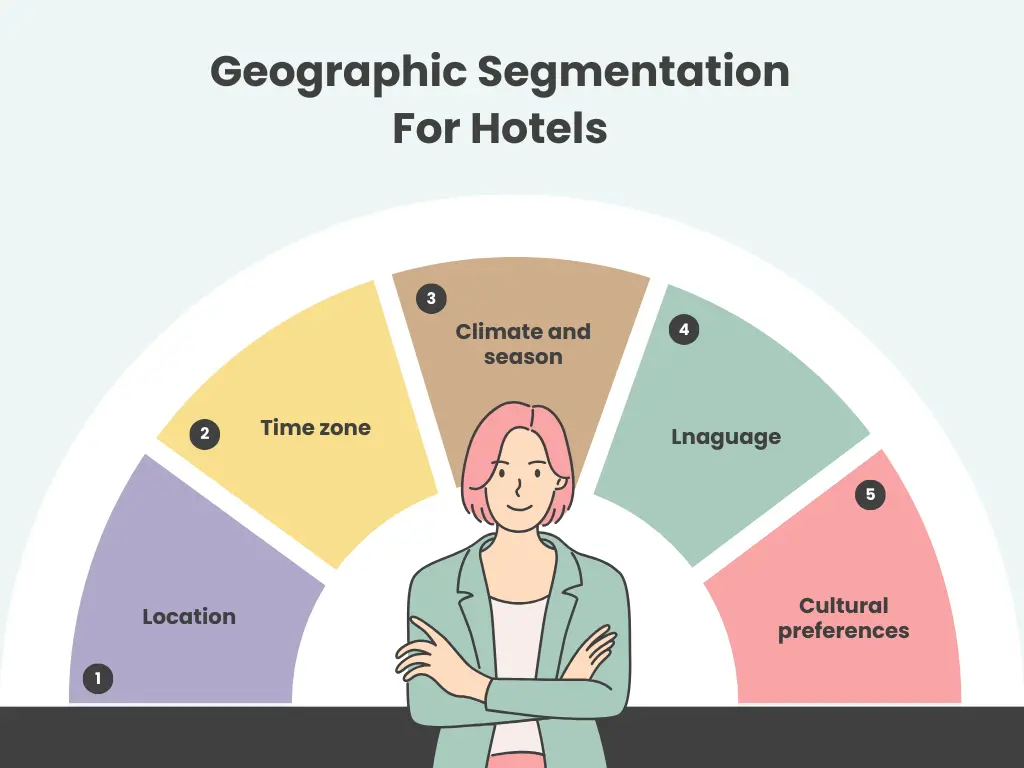
- Demographic segmentation
Hotel demographic segmentation is based on traits like age, gender, ethnicity, income, religion, family makeup, education, etc.
To carry out demographic segmentation, we determine which demographic factors are most relevant to the hotel’s offerings. Common variables include age, gender, income, occupation, marital status, education level, and religion.
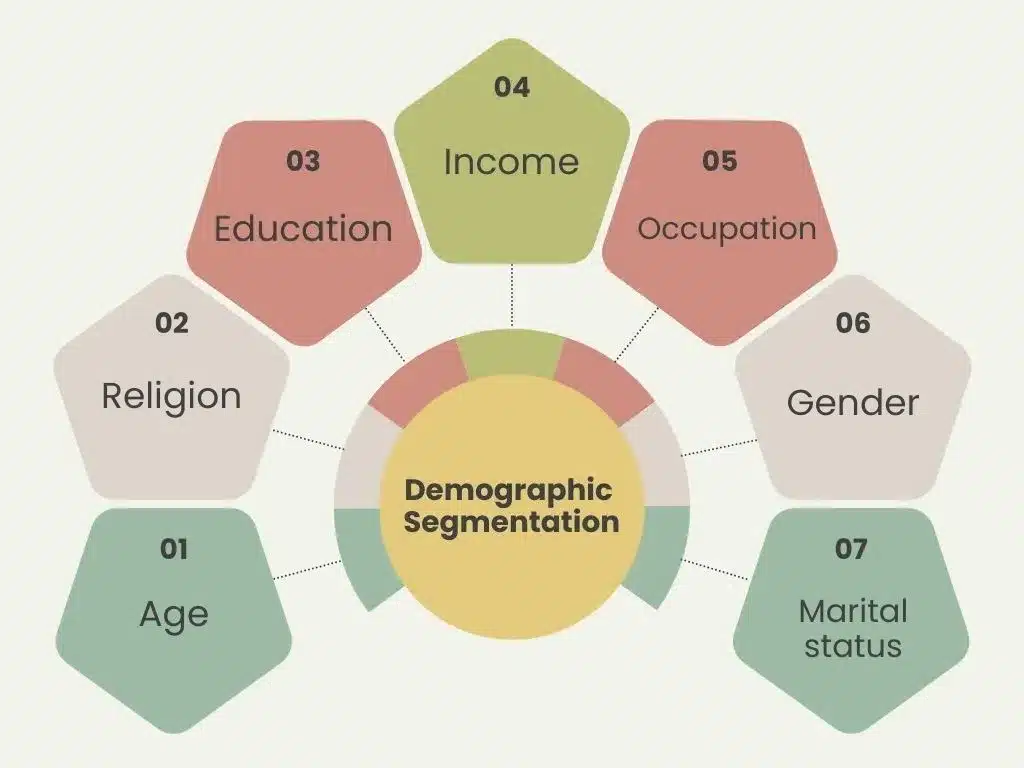
- Psychographic segmentation
Psychographic segmentation in the hotel industry is performed keeping psychological characteristics in mind. Simply put, guests are clustered based on personality, values, beliefs, lifestyle, attitudes, interests, social class, etc.
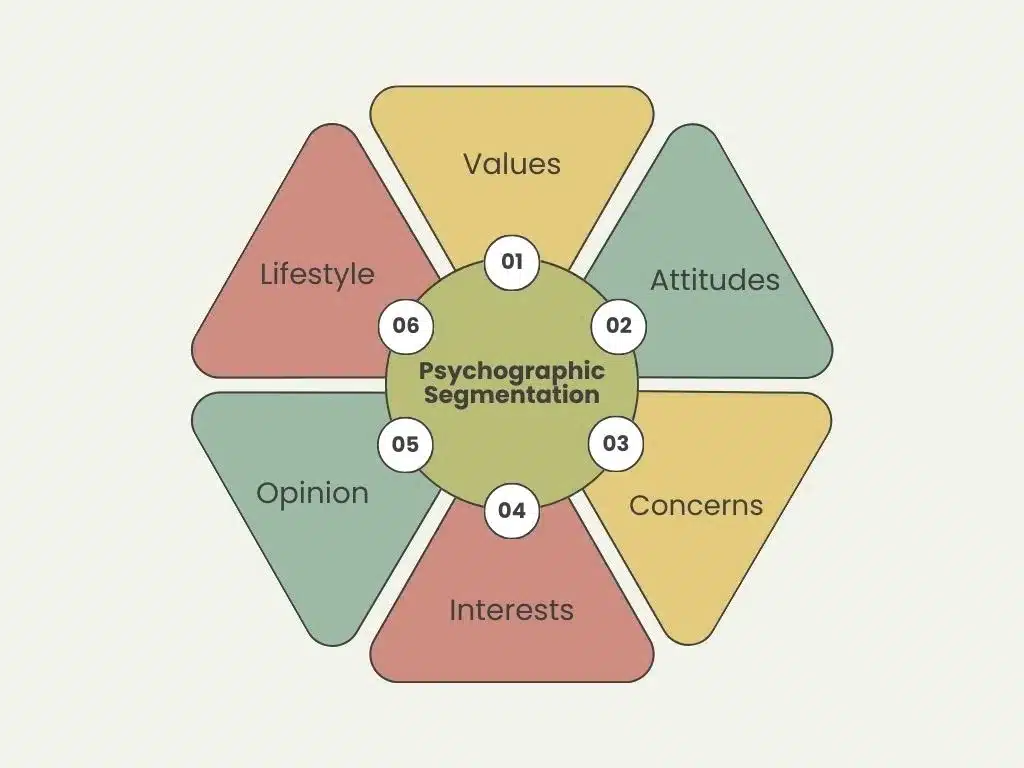
- Behavioural segmentation
Behavioral segmentation in the hotel industry is done by considering guest behavioral patterns. It looks into the following aspects:
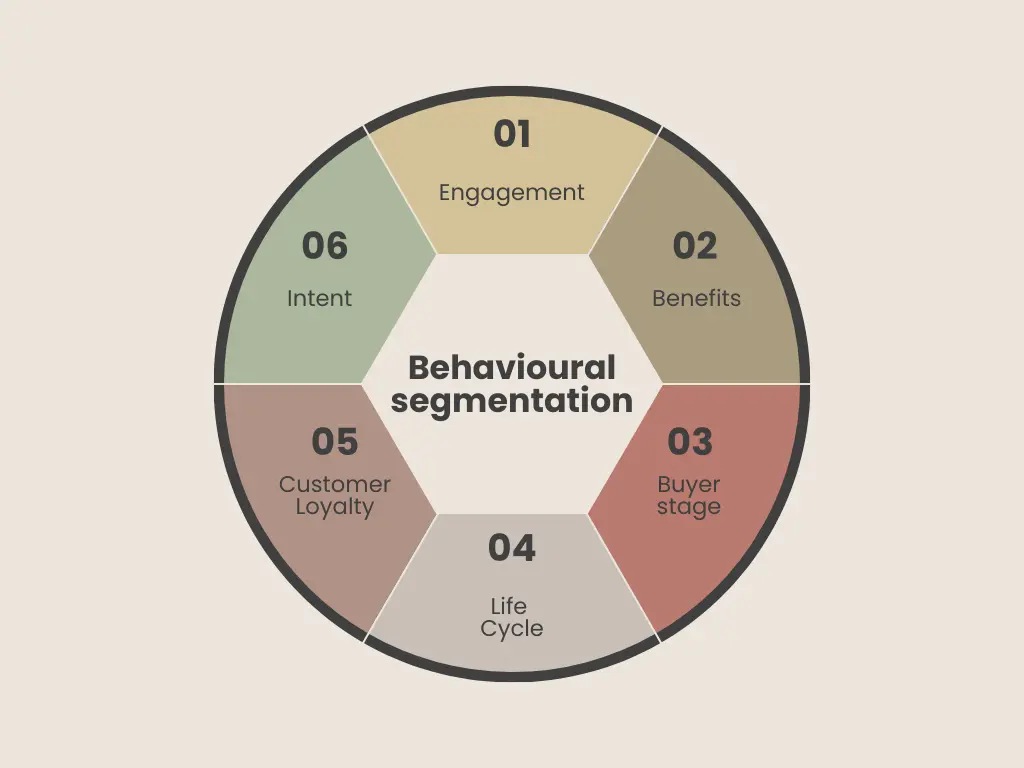
Hotel target market segments based on travel type
- Backpackers
- Retirees
- Families
- Solo travelers
- Couples
- Vacationers
- Adventurers
- Medical tourists
- Business travelers
How We Find the Target Audience for Hotel Website
Getting to know your hotel’s potential guests is like putting together a puzzle. You have various pieces – surveys, online reviews, and guest feedback forms – that need to be assembled correctly. These tools can help you uncover valuable insights into who your current guests are and what they value in their hotel stay.
1. Survey Your Guests
Surveys offer an effective way of understanding travel habits and preferences directly from your guests. By asking targeted questions about booking decisions or favorite amenities, you can gather crucial data on market trends impacting your business.
This method lets hotels understand specific groups better; whether it’s families looking for kid-friendly facilities or solo travelers seeking a quiet retreat. And remember: everyone appreciates being asked their opinion.
2. Dig Deep with Online Reviews
An examination of online reviews offers another goldmine of information. They serve as windows into what potential customers appreciate in a hotel experience—everything from room cleanliness to front desk friendliness could turn up here. Plus, these comments give you direct insight into how well (or not) certain marketing efforts resonate with visitors.
Taking this feedback seriously will let future guests feel heard and valued—it’s just good hospitality industry practice.
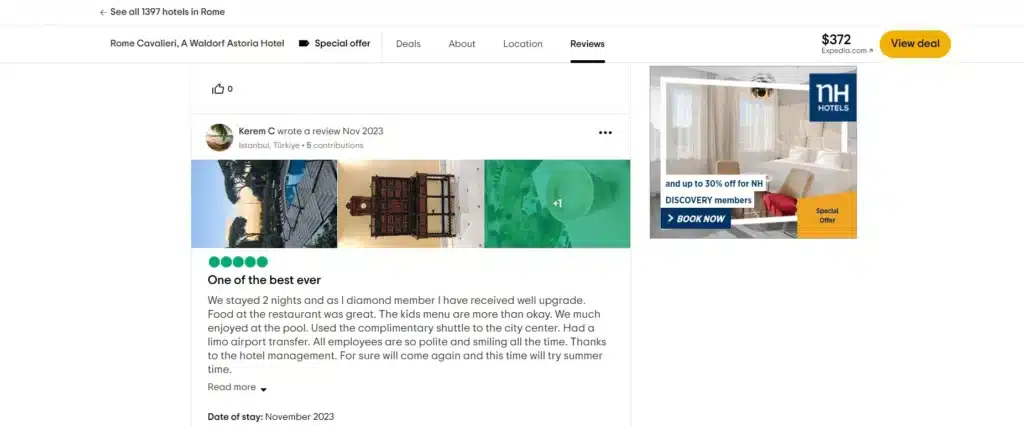
3. Gain Insights Through Feedback Forms
The humble feedback form often gets overlooked but it shouldn’t be underestimated when trying to define your target audience accurately.
Soliciting input after stays allows hotels access firsthand experiences that reveal more than any survey or review ever could—like why someone chose a romantic getaway package over standard accommodation options.
4. Understand Website Visitors’ Demographics and More Using Google Analytics
Google Analytics is free to use and offers some incredible information. This tool can show you who visits your site, where each site visitor is located, what they click on, how long they stay on each page, and so on.
There is a lot of useful data here. It takes a little getting used to but once you get the hang of interpreting the facts and figures you’ll get a better idea of who you’re attracting to your website and whether or not they fit your ideal hotel target market.
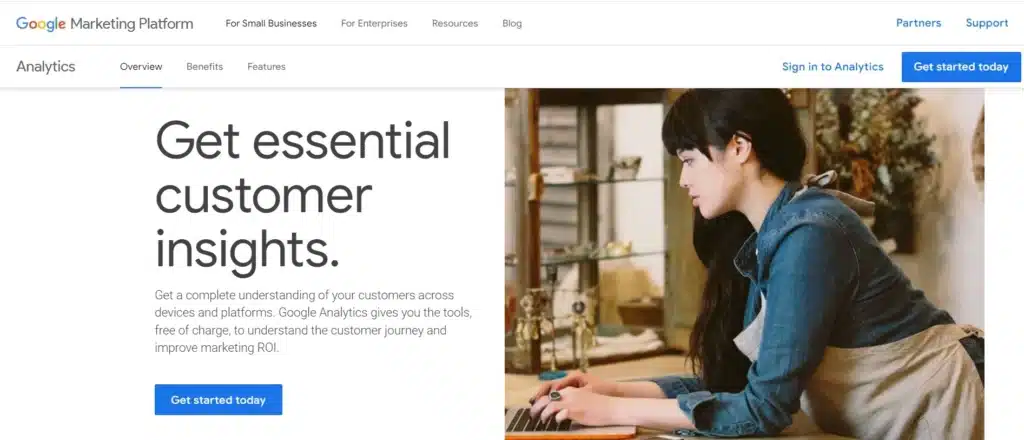
5. Seek out Opinions Being Shared on Social Media
Social media helps gather hotel target market information the same way online reviews do. People love sharing their opinions on Facebook, Twitter, and Instagram. Plus each website offers its own insights tools and opportunities for honest feedback. Mine your social profiles for market research gold then use your newfound knowledge to make your content even more appealing to your hotel target market.
6. Put Yourself In Your Guests’ Shoes
Understanding your hotel market segments is not just about listing income, age, or travel behavior.
Look at your hotel through a guest’s eyes and try to imagine what they feel on their journey from booking to checking in and beyond.
What is good about it and what might be missing or could be improved?
For example, let’s say your property is a hotel with a spa, and you have figured that one of your major hotel target markets is couples traveling for recreational activities.
For this hotel target market, you can consider building couples packages for Spas, massages, and other couple-friendly activities offered by your hotel.
7. Segment the Market
Group your hotel target market into distinct segments based on shared characteristics. For example, you might have segments like “business travelers,” “families,” “millennials,” or “senior citizens.”
To do this, you should analyze your hotel’s database to identify common characteristics among guests. Look for patterns in demographics, booking behaviors, and preferences.
Market segmentation analysis
| Category | Data points to analyze | Common Patterns Observed |
| Demographics | Age, Gender, Occupation | – The majority are millennials aged 25-34.- Equal distribution between male and female guests.- Predominantly business professionals. |
| Booking Behaviors | Booking Channels, Frequency | – 60% book through the hotel website.- 20% are repeat guests.- 40% book last-minute stays. |
| Preferences | Room Types, Amenities | – 70% prefer deluxe rooms with city views.- High demand for in-room spa services.- Priority on high-speed internet and business facilities |
| Length of Stay | Average Length of Stay | – Majority stay for 2-3 nights.- 15% stay for extended periods (5+ nights). |
| Seasonal Trends | Peak Booking Seasons | – Summer months show increased bookings.- A slight dip in bookings during the winter season. |
| Geographic Origin | Location of Guests | – 50% of guests are local residents on staycations.- International guests primarily from Europe and Asia. |
| Loyalty Program | Participation and Benefits | – 30% are enrolled in the loyalty program.- Highest participation from business travelers.- Preferences for discounts and room upgrades. |
| Special Occasions | Celebratory Bookings | – 20% of bookings are for special occasions (anniversaries, etc.).- High demand for personalized celebration packages. |
| Travel Companions | Who people travel with | – 60% travel as couples, seeking romantic getaways.- 25% family groups, with children and multi-generational travelers.- 15% solo travelers, valuing independence and flexibility. |
| Language Preferences | Language Spoken | – English is the predominant language.- High demand for multilingual staff.- Requests for translated materials and services. |
| Source of Reviews | Review Platforms | – Most reviews are on TripAdvisor and Google.- Positive sentiments about personalized service and experiences. |
| Feedback Themes | Common Guest Comments | – Consistent praise for attentive staff.- Some mention the need for more family-friendly amenities.- Requests for additional eco-friendly initiatives. |
This table can be used as a starting point to analyze your guest data. Feel free to customize the table further based on your specific needs and available data.
After the analysis, you can define the criteria for segmentation based on your findings (demographics, psychographics, behavior, etc.). Prioritize criteria based on their relevance and impact on guest satisfaction.
8. Create Customer Personas
Develop detailed customer personas representing different market segments. These personas should include information on the typical guest’s age, income, preferences, and travel habits. This exercise helps humanize your target audience and guides marketing strategies.
One of our favorite tools to create a customer persona is HubSpot’s Make My Persona. It will allow you to create a customer persona in just a few steps.
To help you with the creation of your persona, our team at DesigningIT also prepared a Customer Persona example for you.

Click to download the customer persona
Here is another example created by the Buyer Persona Institute: Buyer Persona Example
Targeting Specific Market Segments in the Hotel Industry
In the hospitality industry, recognizing and catering to specific market segments is vital. Hotels need to make sure their marketing efforts resonate with groups like business travelers or families.
Main market segments hotels can target:
- Backpackers
- Retirees
- Families
- Solo travelers
- Couples
- Vacationers
- Adventurers
- Medical tourists
- Wellness, spa
- Business travelers
- Sport
- Adult only
- Event/Conference attendees
- Budget travelers
- Luxury travelers
- Pet-friendly
Solo Travelers And Medical Tourists – A Rising Trend
An intriguing rise has been observed within two interesting sub-groups – adventurers seeking thrill-filled holidays and medical tourists traveling primarily for healthcare purposes but also enjoying local sights during their stay. Catering specifically to these groups could give you an edge over competitors as it’s not yet widely catered towards.
How to Target Solo Travelers
- Highlight Safety and Security Measures
In the world of solo travel, safety is paramount. Solo travelers need to know that their chosen accommodation provides a secure environment where they can rest easy after a day of exploration.
This means emphasizing the safety and security features of your establishment in your marketing materials. Showcasing these features not only increases your hotel’s appeal but also builds trust with potential guests.
- Create a Solo Traveler-Friendly Environment
The environment of your hotel can play a significant role in attracting solo travelers. These guests often seek spaces where they can both enjoy their solitude and socialize with others if they wish. By understanding this balance, you can create an environment that caters to the unique needs of solo travelers.
- Organize Activities
Another way to foster a solo traveler-friendly environment is by organizing group activities. This not only provides entertainment for your guests but also creates opportunities for them to bond.
For example, if your hotel is in a scenic location, you could organize group hikes or sightseeing tours. This allows solo travelers to explore the area in a group setting, providing a sense of security while also offering a chance to connect with other guests.
You could also consider activities like cooking classes, wine tasting, or local craft workshops. These experiences provide value to your guests, make their stay more memorable, and can lead to meaningful connections between solo travelers.
Exploring solo traveler vlogs provides valuable insights into their hotel preferences. By identifying recurring themes among these vlogs, you can refine your strategies to incorporate features that resonate with solo travelers. To further illustrate this point, here’s a video example for you to consider:
How to target medical tourists
- Health and wellness packages
Designing specialized health and wellness packages is a key strategy to attract and accommodate medical tourists effectively.
One of the ways to attract medical tourists is to showcase on your website that you have dedicated rooms or floors that are designed with the comfort and well-being of recovering patients in mind. Ensure these spaces are equipped with adjustable beds, comfortable seating, and ample space for medical equipment.
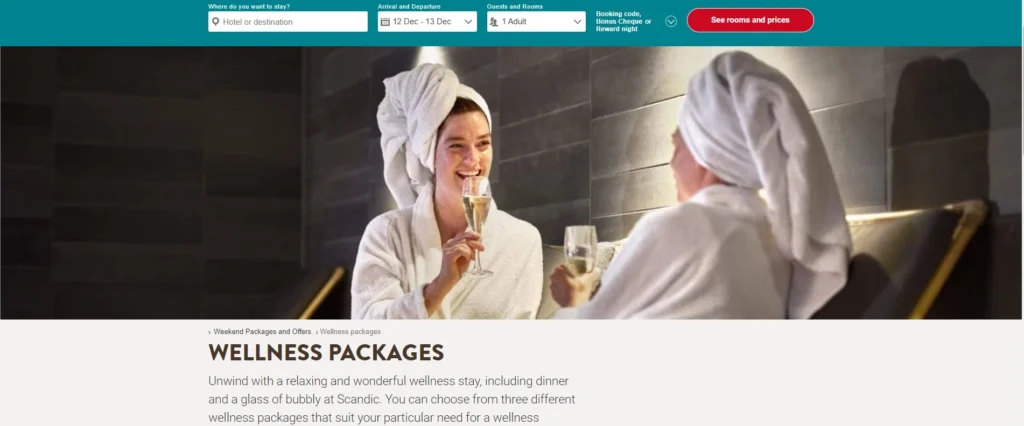
- Transportation assistance
Collaborate with reputable transportation services to offer seamless transfers between the hotel and medical facilities. Clearly outline this service in your health and wellness packages, emphasizing the convenience of stress-free travel for patients in recovery.
- Nutrient-rich meal plans
Don’t forget to mention in your marketing channels that your hotel offers nutrient-rich meal plans to its visitors.
Work with nutritionists to design specialized meal plans that cater to the nutritional needs of recovering patients. Highlight the availability of these tailored meal options in your health and wellness packages, promoting the importance of a healthy diet in the recovery process.
Business Travelers vs. Vacationers
Differentiating between business travelers and vacation goers plays an essential role too.
1. Business travelers
Business travelers form a crucial segment for many hotels. They look for convenience, comfort, and efficiency above all else. By offering services such as free Wi-Fi access, dedicated workspaces within rooms, express check-in/out options and flexible cancellation policies, hotels can cater to this group effectively.
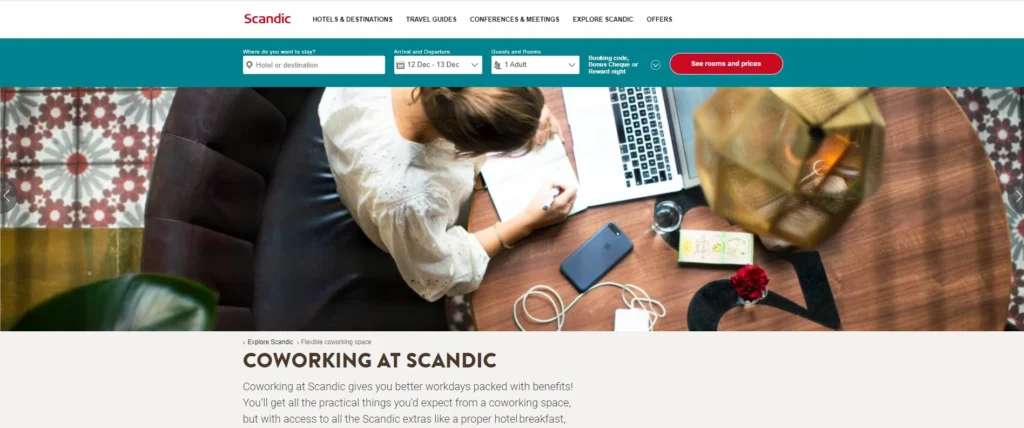
Beyond these amenities though, it’s also about understanding changing market trends. The advent of remote working has shifted what business travel looks like – some might now extend their stay over weekends or bring family along. This evolving dynamic means your hotel needs a responsive strategy that addresses shifting needs.
If your hotel target market includes business travelers, you should have a look at the CitizenM Hotel group for inspiration:
CitizenM Hotel group has a separate web page designed for business travelers.
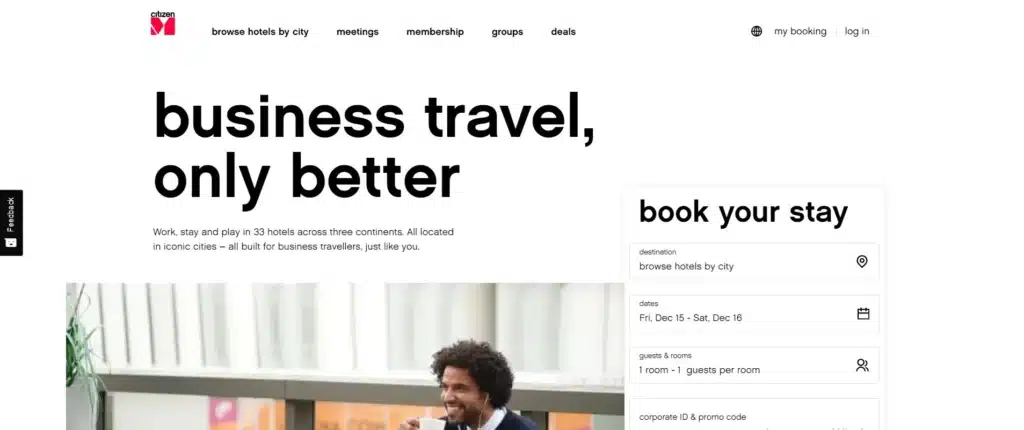
On the webpage, they have emphasized all the benefits the hotel has tailored for business travelers: remote work opportunities with super fast wifi, plenty of desk space, and many plug sockets:
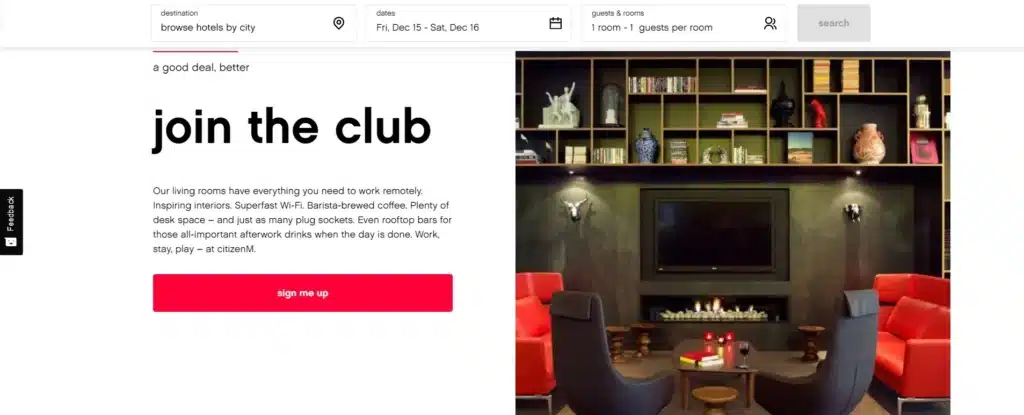
The website also includes a separate webpage for booking meeting rooms with all the required amenities.
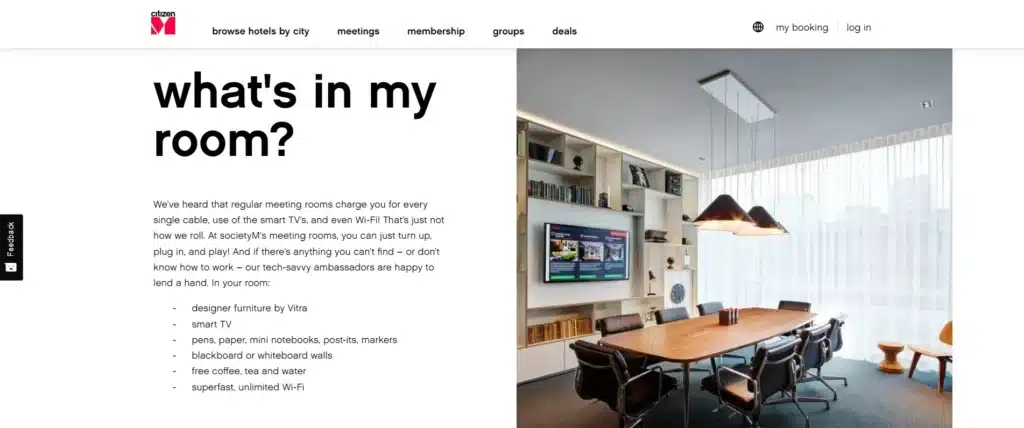
Here are the essential features that hotels should include on their websites to target business travelers:
- Wi-Fi speed and reliability
- Business center information, such as facilities, equipment, and hours of operation
- Meeting and conference facilities
- Business packages and offers
- Online booking for meeting rooms
- Corporate loyalty programs
- Proximity to business districts
- In-room workspace
- Business concierge services, such as arranging transportation, scheduling meetings, or providing local business information
- Dining options with business-friendly hours
- Event calendar and networking opportunities
- Guest reviews from business travelers
2. Vacationers
Vacationers, on the other hand, have completely different preferences when choosing a hotel for stay. Their primary goal is relaxation, not business-related activities. Consequently, the features and benefits highlighted on the hotel’s website should be tailored to cater specifically to the needs and desires of vacationers.
Here are just a few examples to help you target vacationers:
An effective strategy to attract vacationers is to spotlight the hotel’s close proximity to renowned attractions, landmarks, and recreational sites.
An illustrative example is the Anantara Palazzo Hotel in Rome, which emphasizes its location as a key advantage for guests, showcasing the allure of nearby attractions.
“Our palatial hotel also boasts one of the most enviable locations in the city center, with iconic sites such as the Fori Imperiali, Via Veneto, Trevi Fountain, and the Spanish Steps all within walking distance. After a day of exploration, return to an evening of rooftop relaxation overlooking the Eternal City.”
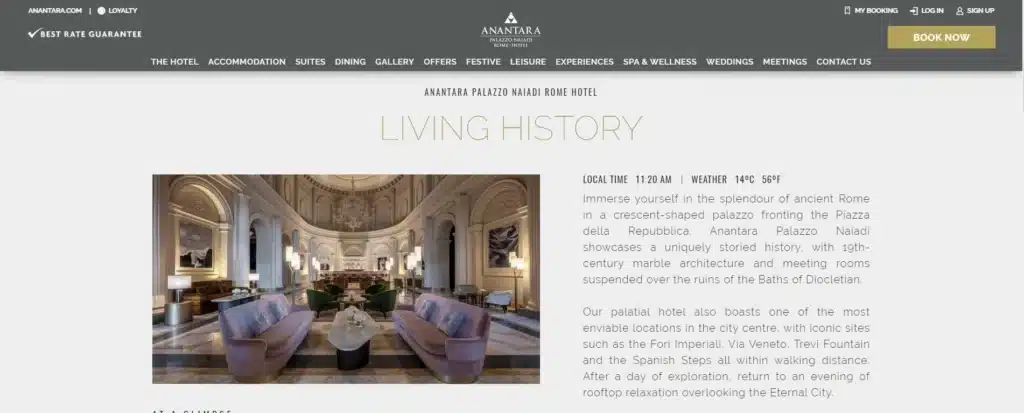
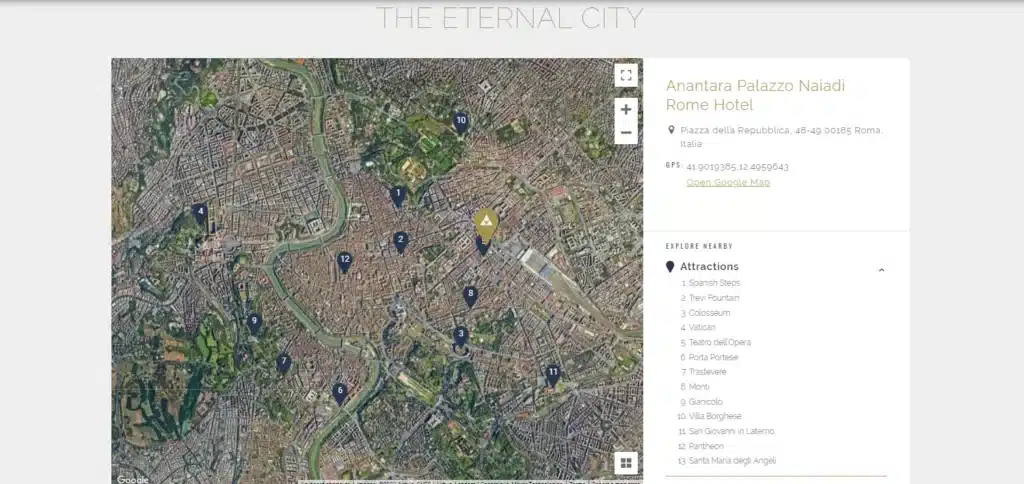
Other features to include for targeting vacationers:
- Local experiences and tours that guests can book through the hotel
- Leisure facilities such as swimming pools, spa services, fitness centers, and recreational activities
- On-site dining options, including restaurants, cafes, and bar
- Flexible check-in and check-out options to accommodate vacationers with varying travel schedules
- Seasonal decor or themed experiences
- Destination guides, maps, and local insights
- Events calendar that showcases local festivals, concerts, and entertainment
Attracting Families as Potential Guests vs. Adult-Only Hotels
Families present another important target audience in the hotel sector. When traveling with young children especially, parents value facilities such as child-friendly menus at on-site restaurants or the availability of cribs and high-chairs.
To attract this specific market segment further consider planning activities tailored towards them – maybe a kid’s club? How about special deals during the school holidays? Social media plays an instrumental role here too; sharing images showcasing happy families enjoying your property could persuade potential guests looking for a relaxing family vacation spot.
Nickelodeon Hotels & Resorts chain is a great example to consider. The website highlights all the main features that families pay attention to when choosing a hotel: family-friendly activities, kid’s club, entertainment, spa & wellness, special offers, and more!
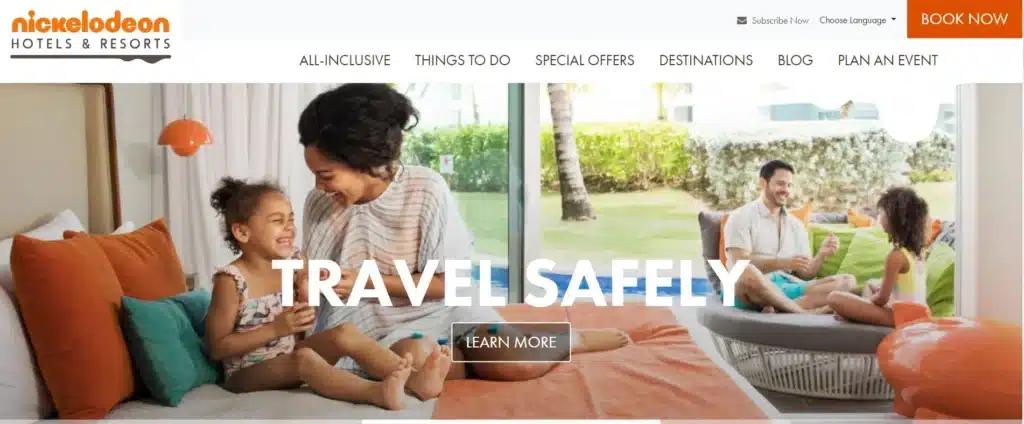
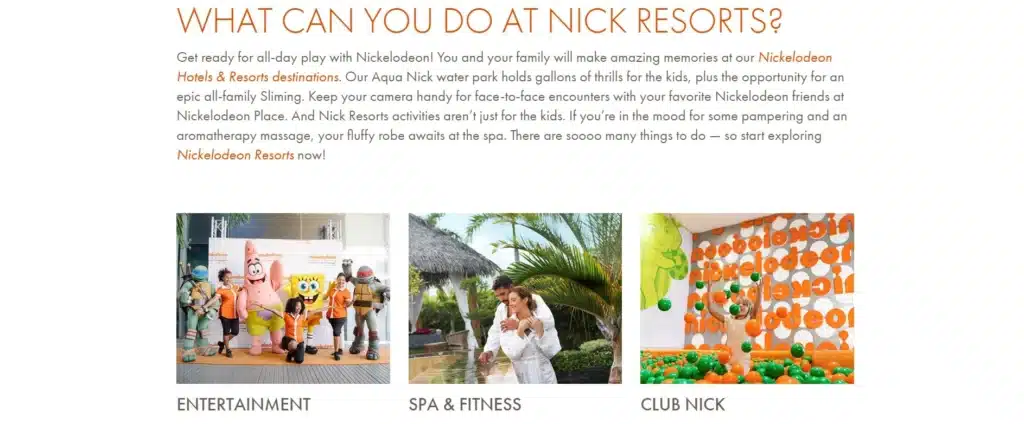
Another example is Walt Disney World Resort, with special offers for kids and parents, a dining plan with a kid’s menu, vacation planning services, and more:
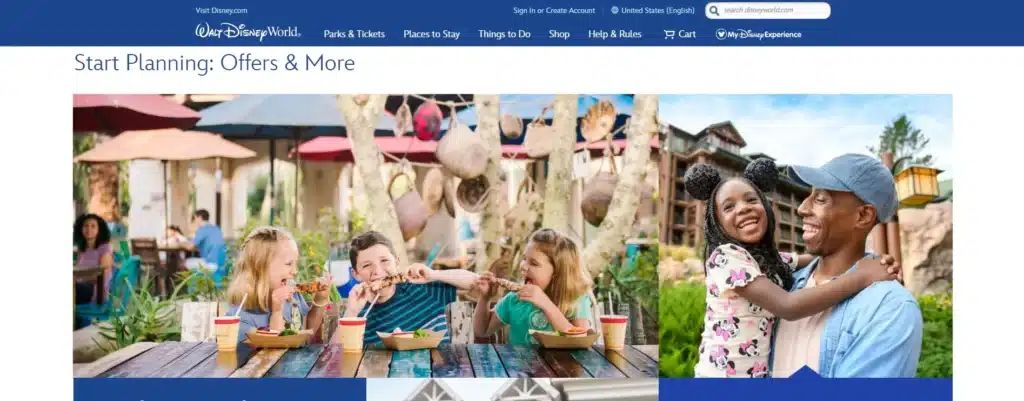
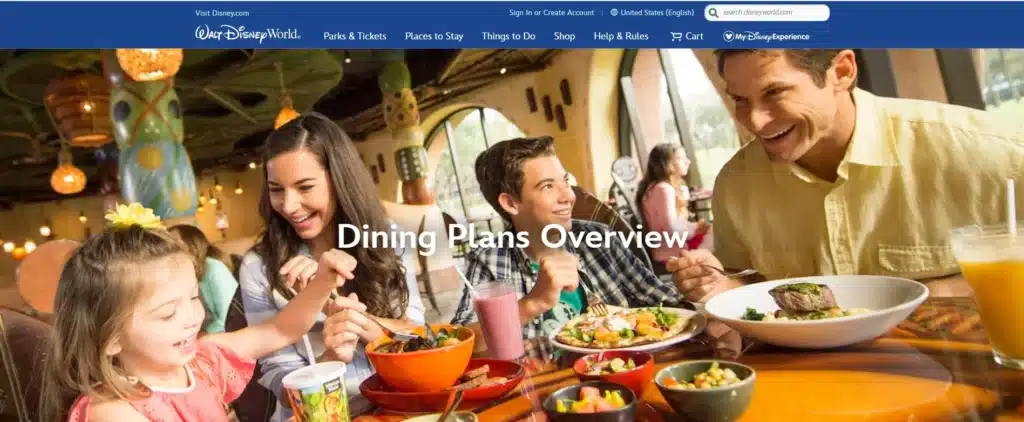
Other features to include for targeting families:
- On-site facilities tailored for children, such as play areas, game rooms, or kid’s clubs
- Child safety measures, including childproofing options, secure pool areas, and monitored access points
- Special kids’ menus
- Babysitting or childcare services
- Family-friendly activities or events, such as movie nights, arts and crafts sessions, or outdoor adventures
- Educational or cultural programs designed for children
- Outdoor play spaces
- Family-travel packages
Adult-only hotels are for a more mature audience, and their websites should reflect this exclusive and serene atmosphere. Here are features to consider including on adult-only hotel websites:
- Age verification feature during the booking process
- Emphasizing quiet atmosphere
- Showcasing services such as massages, beauty treatments, and wellness programs
- Adult-focused entertainment options, such as live music, evening cocktails, or themed events
- Exclusive features, along with any private cabanas or lounging areas
- Culinary experiences, including wine tastings, cooking classes, or gourmet-themed events
Targeting couples
Targeting couples as a hotel owner requires a strategic approach that emphasizes romantic experiences, privacy, and shared activities. Here are some effective ways to attract and cater to couples:
- Create romantic packages
Develop special romantic packages that include features such as candlelit dinners, couples’ spa treatments, and room decorations. Highlight these packages on your website and promotional materials.
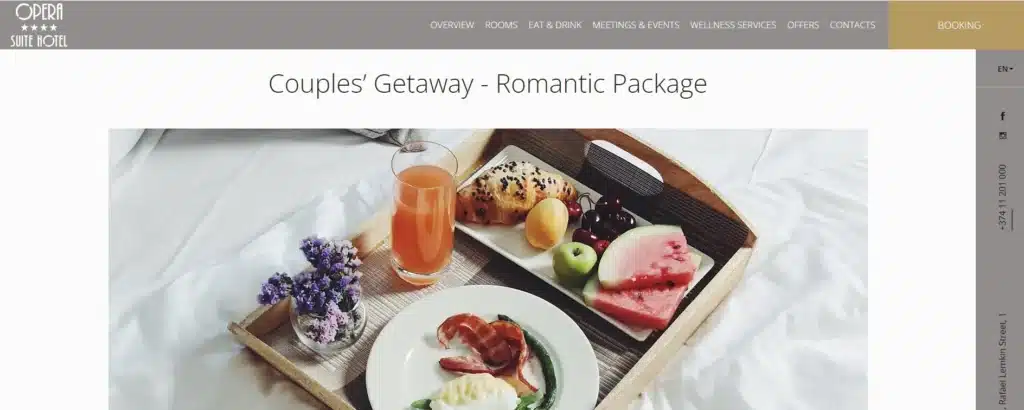
- Romantic room designs
Design certain rooms or suites with a romantic ambiance, featuring elements like canopy beds, Jacuzzi tubs, or private balconies. Use soft lighting and elegant decor to enhance the romantic atmosphere.
- Celebrate milestones
Acknowledge and celebrate special occasions like anniversaries or engagements by offering complimentary upgrades, special decorations, or romantic turndown services. Capture and store such information during the booking process.
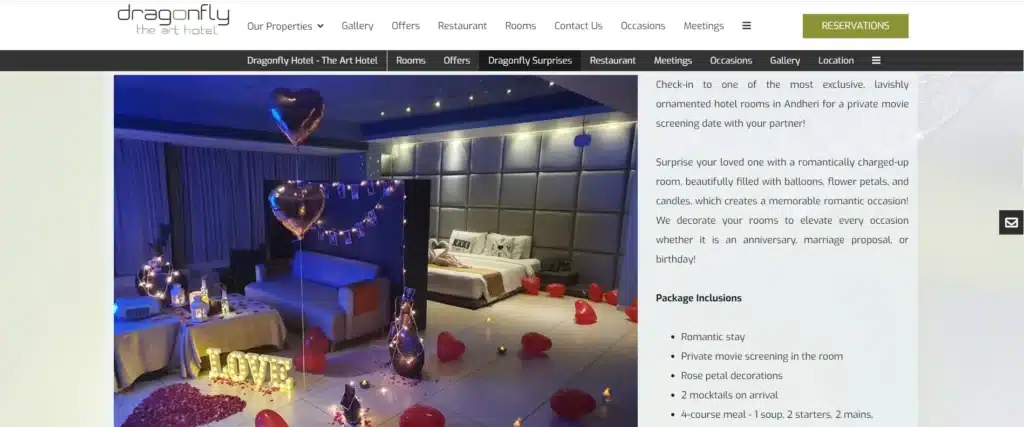
- Online promotion for couples
Highlight couples-specific offerings on your website and social media channels. Use targeted online advertising to reach couples planning getaways, emphasizing the romantic aspects of your accommodations.
Here is an example of a resort that targets only couples with their activities. Jamaica Couples Resorts includes all the activities tailored for couples.
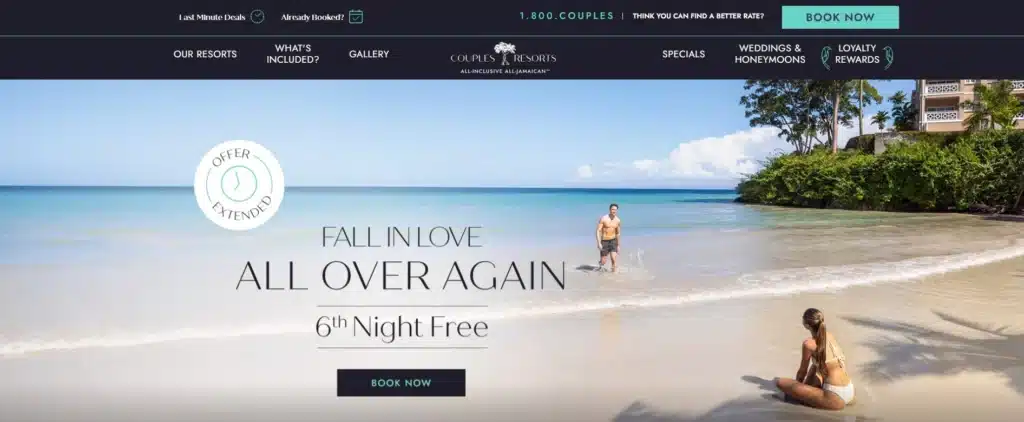
The site features an additional page dedicated to showcasing their wedding and honeymoon services.
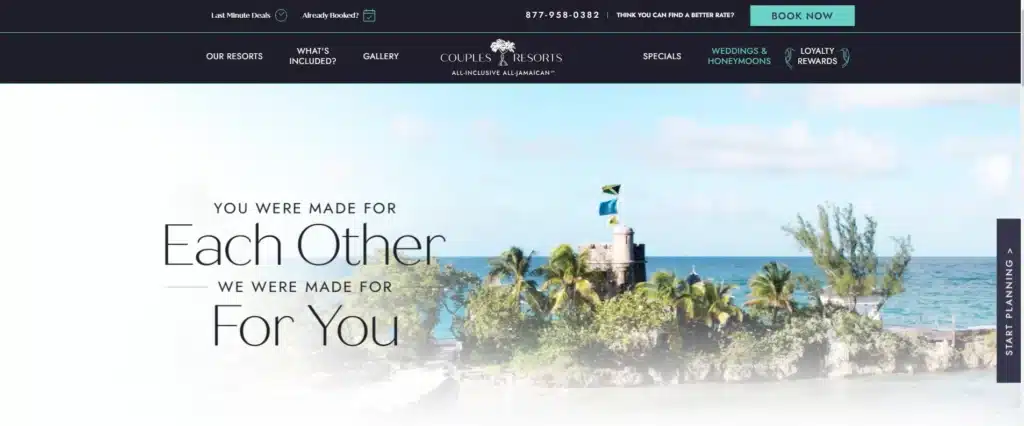
Targeting Sport Lovers
Sport hotels cater to guests with a passion for sports and outdoor activities. To effectively target this audience, their websites should highlight features and amenities that align with active lifestyles.
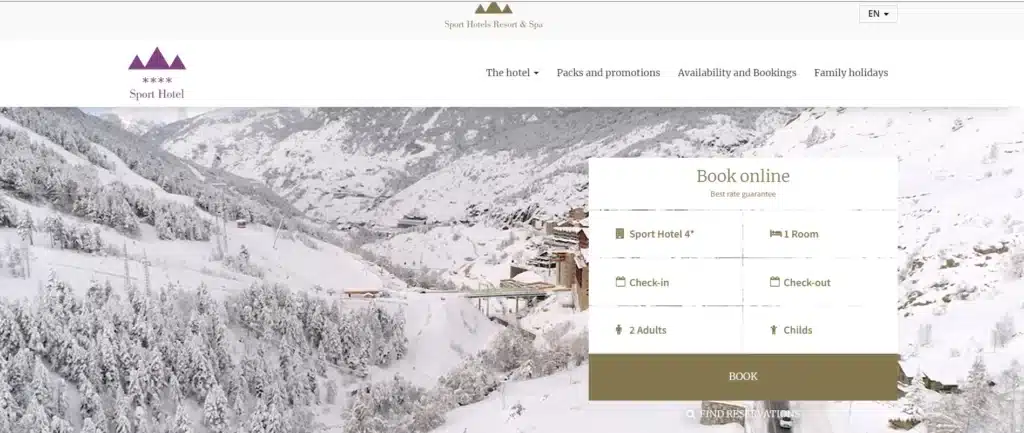
Here are key elements to include for sports hotel websites:
- Showcase the range of outdoor facilities, such as tennis courts, golf courses, hiking trails, or sports fields.
- Highlight well-equipped fitness centers, gyms, or training facilities available for guests.
- Create packages that include adventure excursions, such as mountain biking, kayaking, or skiing.
- Tailor amenities to specific sports enthusiasts, such as bike storage and repair stations for cyclists, ski storage for winter sports enthusiasts, or water sports equipment storage.
- If applicable, feature indoor sports facilities like basketball courts, indoor pools, or rock climbing walls.
- Provide information on nutrition and wellness programs designed for sports enthusiasts.
- Emphasize the hotel’s proximity to major sports venues or events.
Torremirona is a great example of a sports hotel that is tailored for practicing various types of sports, including soccer, golf, cycling, and more!
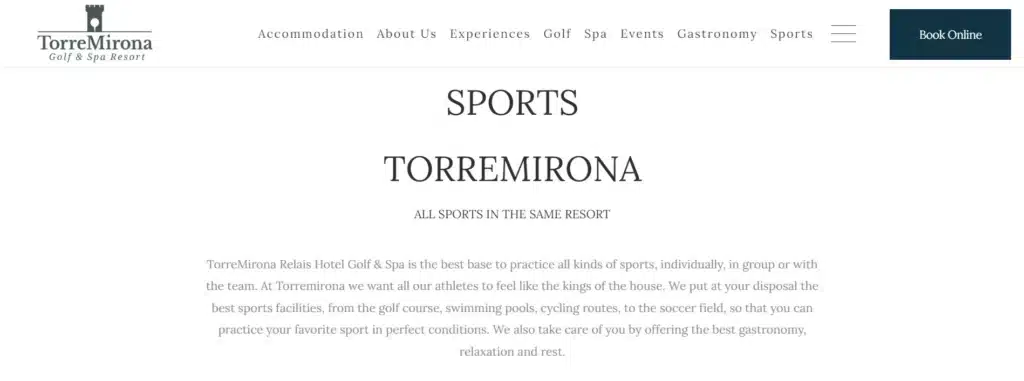
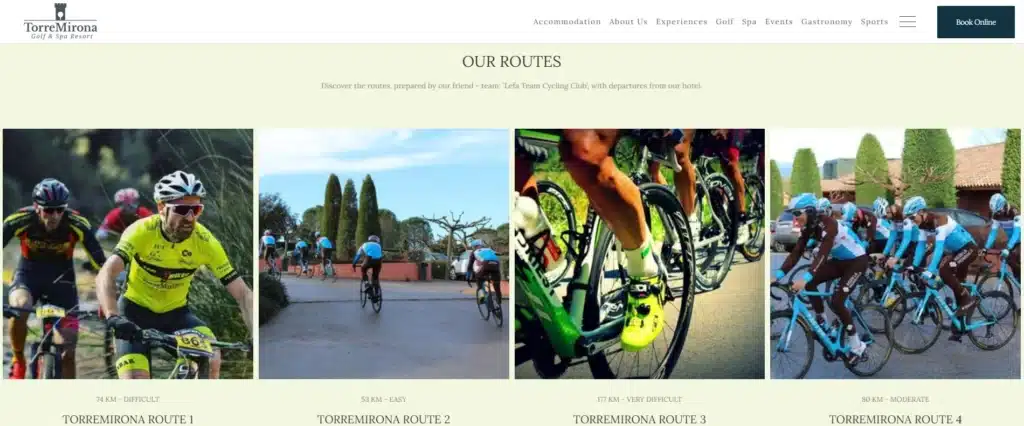
Budget travelers vs luxury travelers
Here’s a simple table outlining some key strategies for targeting budget travelers and luxury travelers:
| Budget Travelers | Luxury Travelers | |
| Pricing Strategy | Emphasize affordability, transparent pricing | Highlight premium pricing, focus on exclusivity |
| Package Offerings | Budget-friendly packages with essential inclusions | Tailored packages with personalized experiences |
| Local Experience Focus | Proximity to affordable attractions and dining | Emphasize luxury experiences and high-end attractions |
| User-Generated Content | Feature reviews and testimonials from budget travelers | Highlight luxury experiences through testimonials |
| Flexible Booking Options | Offer low or no cancellation fees, flexible bookings | Provide flexibility with exclusive perks |
| Community Spaces | Emphasize communal areas, shared kitchens | Highlight exclusive lounges, private spaces |
| Mobile Optimization | Ensure a mobile-friendly website | Optimize for mobile with a focus on visual appeal |
| Social Media Engagement | Active engagement with budget travel communities | Target luxury travel communities on social media |
| Value-Added Services | Offer complimentary services like Wi-Fi or breakfast | Provide premium services as part of the stay |
| Target Audience | Backpackers, solo travelers | Luxury travelers, honeymooners, celebrants |
Here is an example of a luxury hotel website that includes all the main features for attracting luxury travelers: luxury rooms and suites with stunning views, wellness, illustrious dining, and more.
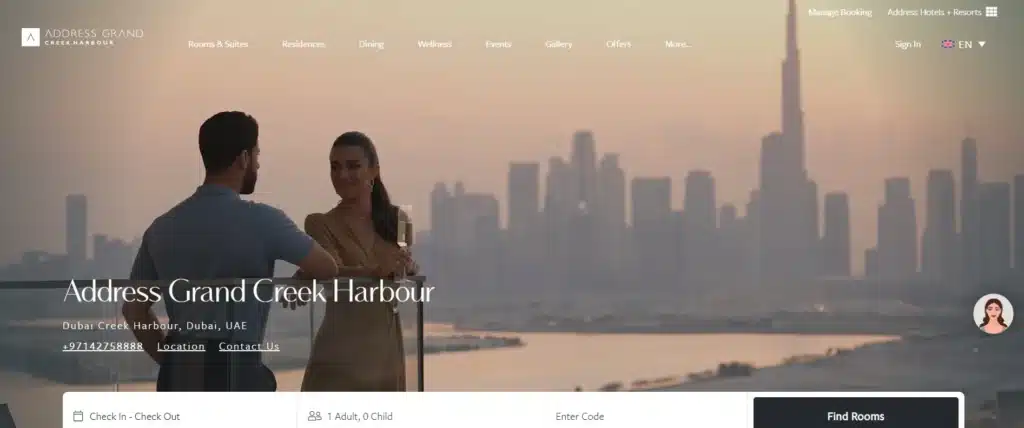
Utilize Online Tools for Improved Hotel Marketing
The hospitality industry is brimming with opportunities, but also challenges. To overcome these hurdles and make the most of market trends, hotels need to embrace online tools that can amplify their marketing efforts.
Hotel Booking Engines
A well-designed booking engine doesn’t just help guests secure a room; it enhances their entire journey. From showcasing hotel amenities to processing transactions securely, an effective booking engine solution makes direct bookings seamless and straightforward.
Beyond simplifying reservations, a robust booking engine allows you to gather valuable data about your target audience’s preferences. It helps identify patterns in travel habits that inform future marketing campaigns tailored specifically for them.
Using Property Management Software
While booking engines drive direct sales, property management software optimizes operational efficiency. A comprehensive system lets you manage all aspects of your hotel business from one place – be it housekeeping schedules or financial reports.
This not only frees up time for more guest-focused activities but also provides key insights into market segments and individual guest behaviors – helping you tailor experiences better suited to specific groups like families on vacation or solo travelers exploring new cities.
Social Media Platforms: Unveiling the Power of Digital Word-of-Mouth
In this era where word-of-mouth travels faster than light (or so we think), social media platforms are indispensable tools in any modern marketer’s toolkit. They allow hotels to reach out directly to potential guests based on specific preferences—be they luxury seekers looking forward to a romantic getaway or budget-conscious travelers planning a solo adventure.
Moreover, social media enables you to foster genuine connections with your guests. Responding promptly and personally to online reviews or queries helps establish trust, building loyal relationships that transcend the one-time stay experience.
The Key is Integration
But, the real magic unfolds when these tools – booking engines boosting sales, property management software improving operations, and social media platforms strengthening brand presence – all work together in harmony.
FAQs about Hotel Target Market
Who are the customers of hotels?
Hotel customers range from vacationers and business travelers to event attendees. They might be individuals, families, or groups seeking a comfy stay away from home.
What are the three main groups hotels target?
The hotel industry often targets leisure travelers, corporate clients for business travel, and meeting/event guests as their primary market segments.
Who is the target audience of budget hotels?
Budget hotels usually aim at cost-conscious travelers such as backpackers, solo explorers, students, or small families looking for value-for-money accommodation options.
Who is the target audience of luxury hotels?
The target audience of luxury hotels includes high-income individuals, business executives, celebrities, couples and honeymooners, affluent tourists, those celebrating special occasions, wellness enthusiasts, art and culture connoisseurs, frequent travelers, and businesses hosting exclusive events. These individuals prioritize premium accommodations, personalized services, and exclusive experiences.
What is the hotel industry market?
The hotel industry market includes all establishments providing paid lodging services – from luxury resorts to budget motels. It’s part of a larger sector known as hospitality and tourism.
Conclusion
So, you’ve journeyed with us through the complex terrain of hotel target market segmentation. You now know that defining your hotel’s target audience can transform guest experience and competitiveness.
You learned how tools like surveys or online reviews can give insights into guests’ preferences and travel habits. We also explored luxury hotels’ unique needs for customer segments which boost revenue.
We discussed specific marketing efforts for business travelers and families. And we unveiled how booking engines or property management software amplify your reach to potential guests.
Remember, knowing who fills those bustling lobbies every weekend is crucial. It’s all about understanding what each guest seeks from their stay at your hotel – whether it’s a romantic getaway or a solo adventure!
Your grasp of this concept shapes the future success of your properties in an ever-changing hospitality industry landscape. Stay informed, keep learning, and see the benefits roll in!

